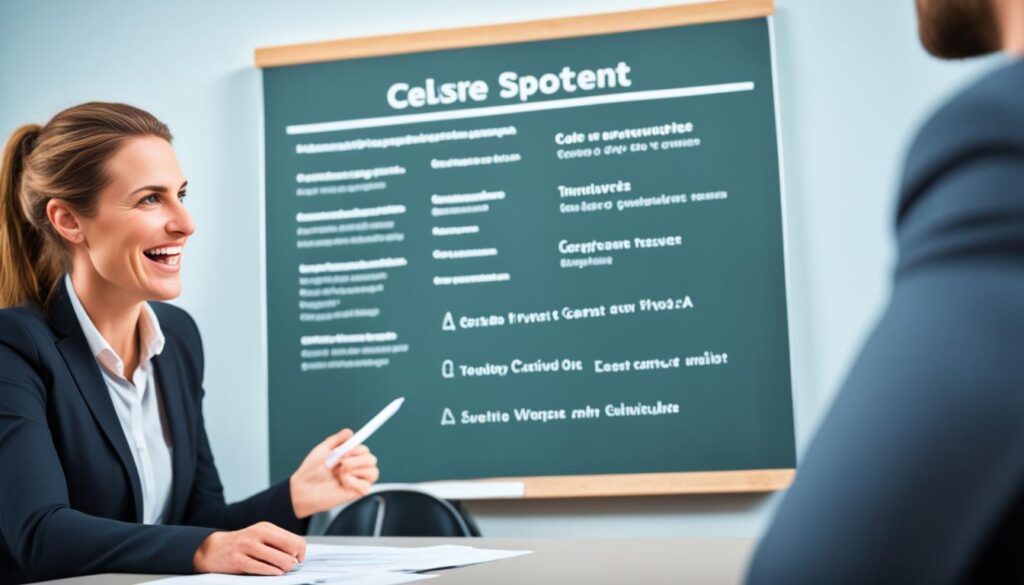Did you realize that an **incredible 82%** of hiring managers think that a candidate’s personality holds as much weight as their skills in the hiring process? Quite astonishing, isn’t it? This data shines a light on the importance of demonstrating your personality during interviews. Are you ready to step up your game and impress potential employers with who you are as a person? Let’s dive in and uncover the secrets to mastering this crucial aspect of job hunting!
Interviews can be nerve-wracking, but showing your personality is key to making a lasting impression. In this article, we will explore effective ways to showcase your unique charm and personality in an interview. From mastering the “describe yourself” question to crafting a memorable introduction and highlighting your skills and experience, we’ll provide you with valuable insights and tips to help you shine.
Key Takeaways:
- 82% of hiring managers consider a candidate’s personality just as important as their skills.
- Showcasing your personality is crucial for making a lasting impression in interviews.
- We will explore effective ways to showcase your personality, including mastering the “describe yourself” question and crafting a memorable introduction.
- Highlighting your skills, emphasizing your career goals, and demonstrating positive traits and attitude are key components of showcasing your personality.
- Authenticity, honesty, body language, and soft skills also play important roles in portraying your personality in interviews.
Mastering the “Describe Yourself” Question
One common question in interviews is describe yourself. This question allows the interviewer to get a sense of who you are and how you view yourself. Answering this question effectively is essential for showcasing your personality and making a positive impression.
When describing yourself in an interview, it’s important to focus on your key qualities and attributes that are relevant to the job you’re applying for. Consider the following tips:
- Be specific: Instead of general statements, provide specific examples that highlight your skills, experiences, and achievements.
- Showcase your strengths: Highlight your positive personality traits, such as being detail-oriented, adaptable, or a strong team player.
- Connect with the job requirements: Tailor your description to align with the job description and emphasize how your personality and skills make you a suitable candidate.
Here is a sample answer that demonstrates these tips:
As an experienced project manager, I would describe myself as an organized and strategic thinker. I am highly skilled in managing complex projects, collaborating with cross-functional teams, and delivering results within tight deadlines. My attention to detail and ability to adapt to changing priorities have been key factors in my successful track record. Moreover, my strong interpersonal skills enable me to effectively communicate and build relationships with stakeholders at all levels. I am motivated by challenges and thrive in a dynamic work environment where I can contribute my analytical mindset and leadership abilities. Overall, I am passionate about driving projects to success and making a positive impact within organizations.
Remember, an authentic and well-crafted description of yourself can set you apart from other candidates and leave a lasting impression. By highlighting your unique personality and showcasing your relevant skills and experience, you can increase your chances of landing the job.
Next, we will explore the art of crafting a memorable introduction that captures the attention of interviewers and sets a positive tone for the rest of the conversation.
Crafting a Memorable Introduction
Introducing yourself in an interview is a golden opportunity to make a lasting impression and showcase your unique personality. A strong and memorable introduction can set the tone for the conversation and capture the attention of the interviewer. Here are some valuable tips to help you craft an introduction that stands out:
Start with a Unique Opener
First impressions matter, so grab their attention from the very beginning. Consider starting your introduction with a thought-provoking question, an interesting anecdote, or a captivating statement related to the job or company. This will instantly engage the interviewer and make you memorable.
Use a Proper Salutation
Show respect and professionalism by addressing the interviewer appropriately. Always begin with a polite greeting, such as “Good morning” or “Nice to meet you.” Using the interviewer’s name adds a personal touch and helps to establish a friendly connection.
Pay Attention to Body Language
Your body language speaks volumes about your confidence and enthusiasm. Maintain good posture, make eye contact, and offer a warm smile. These nonverbal cues convey a positive impression and show that you are truly engaged in the conversation.
Body language is a powerful form of communication that can greatly influence the way others perceive you.

Remember, your introduction should be concise and focused, highlighting key aspects of your background and qualifications. It’s an opportunity to showcase your enthusiasm, passion, and compatibility with the job and company culture. By following these tips, you can create a memorable introduction that leaves a positive and lasting impression in any interview.
Highlighting Your Skills and Experience
When it comes to interviews, showcasing your skills and experience is crucial for demonstrating your value to potential employers. By effectively describing your expertise, you can position yourself as a competitive candidate.
Here are some key strategies to highlight your skills and experience in an interview:
- Quantify your achievements: Use specific numbers, percentages, or metrics to showcase the impact of your previous work. This not only adds credibility to your claims but also helps employers visualize your potential contributions.
- Provide concrete examples: Instead of making generic statements about your capabilities, offer specific examples that illustrate your skills in action. This helps interviewers understand how you’ve applied your expertise in real-world scenarios.
- Demonstrate problem-solving abilities: Describe how you have successfully tackled challenges in previous roles. Emphasize your ability to analyze problems, devise innovative solutions, and achieve positive outcomes.
- Showcase relevant experience: Tailor your descriptions to highlight experiences that align with the requirements of the position you’re interviewing for. This helps the interviewer see that you have the necessary background to excel in the role.
By using these strategies, you can effectively communicate your skills and experience to potential employers, giving yourself a competitive edge in the interview process.

Expert Tip:
“When describing your experience, focus on the outcomes you achieved and the impact you made. Employers are interested in seeing tangible results and how your skills can contribute to their organization.”
Emphasizing Your Career Goals
When it comes to sharing your career goals during an interview, it is essential to highlight how they align with the company’s mission and vision. By connecting your aspirations to the organization’s goals, you demonstrate your enthusiasm and dedication to contributing to its success.
To effectively communicate your career goals, consider the following tips:
- Research: Familiarize yourself with the company’s mission, values, and long-term objectives. This knowledge will enable you to align your career goals with the organization’s overall direction.
- Be Specific: Clearly articulate your short-term and long-term career goals, highlighting the skills and experiences you hope to acquire along the way.
- Show Relevance: Discuss how your career goals complement the company’s mission and contribute to its growth and success. Demonstrate how your aspirations align with the organization’s industry position and future outlook.
- Display Ambition: Express your desire to learn, grow, and contribute to the company’s vision. Highlight how your career goals reflect your ambition and commitment to professional development.
“I am excited about the opportunity to contribute to ABC Company’s mission of delivering sustainable solutions to environmental challenges. My career goal is to become a leading expert in renewable energy technology, and I believe that my passion for innovation and commitment to sustainability perfectly align with the company’s vision.”
By emphasizing your career goals and connecting them with the company’s mission, you demonstrate your commitment to the organization’s values and create a compelling narrative that resonates with the interviewer.
Example of Aligning Career Goals with Company Mission
| Company Mission: Enhancing Healthcare Access | My Career Goal: Becoming a Healthcare Administrator |
|---|---|
| Develop innovative healthcare solutions | Lead strategic initiatives to improve patient care and operational efficiency |
| Ensure equitable healthcare access for all | Advocate for healthcare policies that promote equal access and reduce disparities |
| Collaborate with cross-functional teams | Foster interdisciplinary collaboration to enhance patient outcomes and drive organizational success |

Demonstrating Positive Traits and Attitude
Your attitude and outlook on work and life can make a great impression on hiring managers. When describing your positive traits and attitude in an interview, it’s important to choose the right buzzwords and leverage feedback from others to showcase your strengths.
Positive personality traits, such as optimism, adaptability, and resilience, can set you apart from other candidates. Highlighting these traits demonstrates to employers that you have the attributes necessary to thrive in their organization.
“I believe my positive attitude and ability to stay calm under pressure have been instrumental in achieving successful outcomes in my previous roles. This optimism allows me to tackle challenges head-on and find creative solutions.”
When discussing your attitude, provide specific examples that demonstrate how this trait has positively impacted your work. Whether it’s maintaining a team-focused mindset or approaching difficult situations with a problem-solving mentality, these examples show employers that you bring a proactive and positive approach to your work.
To further emphasize your positive traits, consider leveraging feedback from colleagues or supervisors. This external validation provides credibility and evidence of your positive attitude and personality. Highlight any instances where others have commended your teamwork, leadership skills, or ability to inspire those around you.
Remember, showcasing your positive traits and attitude is not about boasting, but about providing genuine and relevant examples that align with the job requirements and company culture.

| Positive Trait | Example |
|---|---|
| Optimism | I approach challenges with a positive mindset, believing that every problem has a solution. |
| Adaptability | I thrive in fast-paced environments and easily adjust to new situations and changing priorities. |
| Resilience | I possess the ability to bounce back from setbacks, learning and growing from each experience. |
| Teamwork | I actively collaborate with colleagues and value the contributions of each team member. |
| Leadership | I have successfully led cross-functional projects, inspiring and motivating team members to achieve shared goals. |
The Importance of Authenticity and Honesty
In an interview, being authentic and honest is of utmost importance. It is crucial to present your true self and provide genuine answers that reflect your personality and values. By doing so, you not only build trust with the interviewer but also increase your chances of connecting with the company culture.
Authenticity is about being true to yourself and not trying to impress or please others. It means expressing your opinions, experiences, and aspirations genuinely, without exaggeration or insincerity. When you are authentic, you showcase your unique qualities and perspectives, making you a memorable candidate.
Honesty goes hand in hand with authenticity. It involves giving truthful responses and avoiding the temptation to embellish or misrepresent your skills or experiences. Honesty builds credibility and shows integrity, both of which are highly valued by employers.
“Authenticity is the daily practice of letting go of who we think we’re supposed to be and embracing who we are.” – Brené Brown
By being authentic and honest in your responses, you demonstrate self-awareness and self-assurance. Embrace your strengths and acknowledge areas for growth. Share personal stories and examples that highlight your values and illustrate how they align with the company’s mission and culture.
Interviewers appreciate candidates who are genuine and transparent. They are looking for individuals who not only possess the required skills but also fit well within the organization. By showcasing your authenticity and honesty, you provide valuable insights into your character and demonstrate your potential as a team member.
Benefits of Being Authentic and Honest in an Interview:
- Building rapport: Authenticity creates a connection with the interviewer, fostering trust and rapport.
- Showcasing individuality: Being authentic allows your unique qualities to shine, making you stand out from other candidates.
- Alignment with company values: Sharing genuine experiences and values demonstrates your alignment with the company’s mission and culture.
- Building a positive reputation: By being honest and authentic, you develop a reputation for credibility and integrity.

Remember, authenticity and honesty are not only essential during the interview but also throughout your career. Embrace who you are, be truthful, and let your genuine self shine through. Your authenticity will not only help you land the job but also contribute to your overall job satisfaction and success.
Sample Answers for Describing Your Personality
In an interview, describing your personality is an opportunity to showcase your unique qualities and how they align with the job role. Here are some sample answers tailored to specific job roles:
Sales Representative:
As a sales representative, I would describe my personality as outgoing and persuasive. I have excellent communication skills and enjoy building relationships with clients. My positive attitude and ability to adapt to different situations make me a valuable asset in closing deals and achieving sales targets.
Project Manager:
As a project manager, my personality can be best described as organized and detail-oriented. I thrive in fast-paced environments and excel at managing multiple tasks simultaneously. I have strong leadership skills and can effectively motivate team members to collaborate towards project success.
Creative Designer:
As a creative designer, my personality is characterized by my passion for innovation and artistic expression. I am constantly inspired by the world around me and enjoy pushing boundaries to create visually captivating designs. My keen eye for aesthetics and attention to detail ensure that my work is of the highest quality.
Remember, these are just examples, and it is important to tailor your answers to your own unique personality and the specific requirements of the job. Use these examples as inspiration to craft authentic and compelling answers that highlight your true potential.
Now, let’s take a look at a table summarizing the different positive traits showcased in the sample answers:
| Job Role | Sample Personality Traits |
|---|---|
| Sales Representative | Outgoing, persuasive, communicative, adaptable |
| Project Manager | Organized, detail-oriented, leadership, adaptable |
| Creative Designer | Innovative, artistic, visually-oriented, attention to detail |
By using these sample answers and tailoring them to your own personality, you can effectively convey your positive traits and demonstrate the value you can bring to a company. Remember, authenticity and sincerity are key to making a lasting impression in your interview.

The Power of Body Language
Nonverbal cues are an integral part of effective communication, and they play a significant role in interviews. Understanding and utilizing body language can help you convey confidence, authenticity, and professionalism.
When it comes to body language in an interview, there are several key nonverbal cues to keep in mind:
- Posture: Sit up straight and avoid slouching. Good posture demonstrates attentiveness and engagement.
- Eye contact: Maintain steady eye contact with the interviewer. It shows that you are actively listening and interested in the conversation.
- Gestures: Use natural and purposeful hand gestures to emphasize key points. However, be mindful of excessive or distracting movements.
- Facial expressions: Smile genuinely and maintain a pleasant expression throughout the interview. It conveys warmth and approachability.
- Handshake: When greeting the interviewer, offer a firm handshake with a confident grip. Avoid a weak or overly aggressive handshake.
By paying attention to your body language, you can make a positive impression and build rapport with the interviewer. Remember, actions often speak louder than words.
“Your body language communicates your attitude and level of confidence. It’s important to be aware of the messages you’re sending nonverbally.” – Jane Johnson, HR Manager
To further illustrate the impact of body language, consider the following:
| Positive Body Language | Negative Body Language |
|---|---|
| A relaxed and open posture | Hunched shoulders and crossed arms |
| Smiling and nodding | Frowning or looking disinterested |
| Direct and confident eye contact | Avoiding eye contact or staring too intently |
| Engaged and animated gestures | Excessive fidgeting or restless movements |
| A firm and confident handshake | A weak or limp handshake |
As you can see, positive body language creates a favorable impression, while negative body language can hinder effective communication. Being mindful of your nonverbal cues can significantly impact how you are perceived during an interview.

The Role of Soft Skills
Soft skills play a crucial role in interviews and can significantly impact your chances of success. While technical skills and qualifications are important, it is often the soft skills that make candidates stand out from the crowd.
Employers highly value soft skills because they demonstrate your ability to work well with others, adapt to new situations, and solve problems effectively. These skills are transferable and can be applied in various work environments, making them essential for career success.
Some commonly sought-after soft skills include:
- Problem-solving: Demonstrate your ability to analyze complex situations, think critically, and come up with innovative solutions.
- Teamwork: Showcase your capacity to collaborate with others, communicate effectively, and contribute to a shared goal.
- Adaptability: Highlight your flexibility in adjusting to changes, learning new processes and technologies, and thriving in dynamic work environments.
By showcasing these soft skills during an interview, you can provide employers with valuable insights into your potential as a candidate. It’s essential to incorporate examples and anecdotes that illustrate how you have utilized these skills in past experiences.
“I believe my problem-solving skills are one of my greatest assets. In my previous role, I faced a particularly challenging project with tight deadlines. By analyzing the situation, gathering input from team members, and thinking creatively, I was able to devise a solution that not only met the deadline but exceeded expectations.”
Remember, soft skills are not easily quantifiable, making it crucial to describe them in a way that showcases their value. Don’t just mention that you have excellent communication skills; instead, provide specific examples of how you effectively communicated with a diverse team to achieve a common objective.
Developing and highlighting your soft skills not only increases your chances of landing a job but also positions you for long-term success within an organization. Employers look for candidates who can not only perform tasks but also contribute to the overall success of the team and the company.

Balancing Substance and Brevity
When delivering a self-introduction, it’s crucial to strike a balance between substance and brevity. You want to make a strong impression by showcasing your personality and qualifications, but you also need to be concise and to the point. Here are some tips to help you achieve this balance:
1. Focus on Key Points
Think about the most important aspects of your background, experience, and skills that you want to highlight in your self-introduction. Instead of providing a lengthy overview, focus on the key points that demonstrate your value as a candidate.
2. Craft a Compelling Opening Statement
Start your self-introduction with a concise and attention-grabbing statement that summarizes who you are and what you bring to the table. This will capture the interviewer’s interest and set the tone for the rest of your introduction.
“My name is [Your Name], and I am a results-driven marketing professional with a passion for creating impactful campaigns that drive business growth.”
3. Use Specific Examples
Support your statements with specific examples that highlight your accomplishments and demonstrate your abilities. This not only adds substance to your self-introduction but also provides concrete evidence of your skills and expertise.
4. Tailor Your Introduction to the Role
Customize your self-introduction to align with the specific requirements and responsibilities of the job you’re applying for. This shows that you’ve done your research and are genuinely interested in the position.
5. Practice and Refine
Before the interview, practice your self-introduction to ensure that it flows smoothly and effortlessly. Time yourself to make sure it falls within a reasonable timeframe, typically around 1-2 minutes. Refine your introduction until it accurately represents your personality and qualifications while being concise.
6. Get Feedback
Seek feedback from trusted individuals, such as mentors or career advisors, on your self-introduction. They can provide valuable insights and suggestions for improvement, helping you strike the right balance between substance and brevity.
Remember, your self-introduction is your opportunity to make a strong first impression. By carefully balancing substance and brevity, you can deliver a concise and impactful introduction that showcases your personality and qualifications.

Conclusion
In conclusion, showcasing your personality in an interview is vital for making a lasting impression. By mastering the “describe yourself” question, crafting a memorable introduction, and highlighting your skills and experience, you can demonstrate your unique charm and stand out as a candidate. Remember to stay authentic, emphasize your positive traits, and effectively use body language to convey confidence and authenticity.
During an interview, it is important to let your personality shine through. Employers not only want to assess your skills and experience but also want to get a sense of who you are as a person. By showing your true self, you will create a connection and leave a positive, long-lasting impression on the interviewer.
Make sure to answer questions with honesty, authenticity, and enthusiasm. Use specific examples from your past experiences to illustrate your abilities and show how you can contribute to the company’s success. Confidence, a positive attitude, and a genuine passion for the role will help you make a memorable impact during the interview process.
FAQ
How can I show my personality in an interview?
To show your personality in an interview, you can start by introducing yourself confidently and using body language effectively. Additionally, emphasizing positive traits and sharing examples that highlight your unique charm and skills can make a lasting impression on hiring managers.
How do I effectively answer the “describe yourself” question in an interview?
When answering the “describe yourself” question, it’s important to provide a concise and authentic response that showcases your positive traits and aligns with the job role. You can emphasize your skills, experience, and goals while relating them to the company’s vision and values.
How can I craft a memorable introduction in an interview?
To create a strong and memorable introduction in an interview, focus on body language, use a proper salutation, and start with a unique opener. By showcasing confidence, enthusiasm, and a genuine interest in the role, you can make a positive first impression.
How can I highlight my skills and experience effectively in an interview?
To effectively highlight your skills and experience in an interview, provide specific examples that demonstrate your problem-solving abilities and how you have contributed to previous organizations. Focus on the relevance of your skills to the job requirements and the value you can bring to the company.
How do I effectively share my career goals in an interview?
When sharing your career goals in an interview, it’s important to connect them with the company’s mission and values. Explain how the position aligns with your long-term objectives and how you plan to contribute to the company’s success while furthering your professional growth.
How can I demonstrate positive traits and attitude in an interview?
To demonstrate positive traits and attitude, choose the right buzzwords and provide examples of situations where you have displayed qualities like teamwork, adaptability, and problem-solving. Additionally, leverage feedback from others to showcase your self-awareness and commitment to personal growth.
How important is authenticity and honesty in an interview?
Authenticity and honesty are crucial in an interview. It’s important to provide genuine answers that reflect your personality and values. Being true to yourself allows employers to understand your true potential and align your qualifications with their requirements.
Can you provide some sample answers for describing my personality in an interview?
Certainly! Sample answers for describing your personality can vary based on the job role. For example, if you are applying for a customer service position, you can emphasize your excellent communication skills, empathy, and ability to handle difficult situations with patience and professionalism.
How important is body language in an interview?
Body language plays a significant role in communication during an interview. It can convey confidence, authenticity, and enthusiasm. It’s important to maintain good posture, make eye contact, and use gestures appropriately to create a positive impression.
What role do soft skills play in an interview?
Soft skills are highly valued by employers in an interview. They demonstrate your ability to work well with others, adapt to different situations, and solve problems effectively. Commonly sought-after soft skills include communication, teamwork, leadership, time management, and creativity.
How can I balance substance and brevity in a self-introduction?
When delivering a self-introduction, it’s crucial to be concise while providing relevant information. Focus on highlighting your personality and qualifications that are most relevant to the job. Avoid overwhelming the interviewer with excessive details and ensure your introduction leaves a lasting impression.









